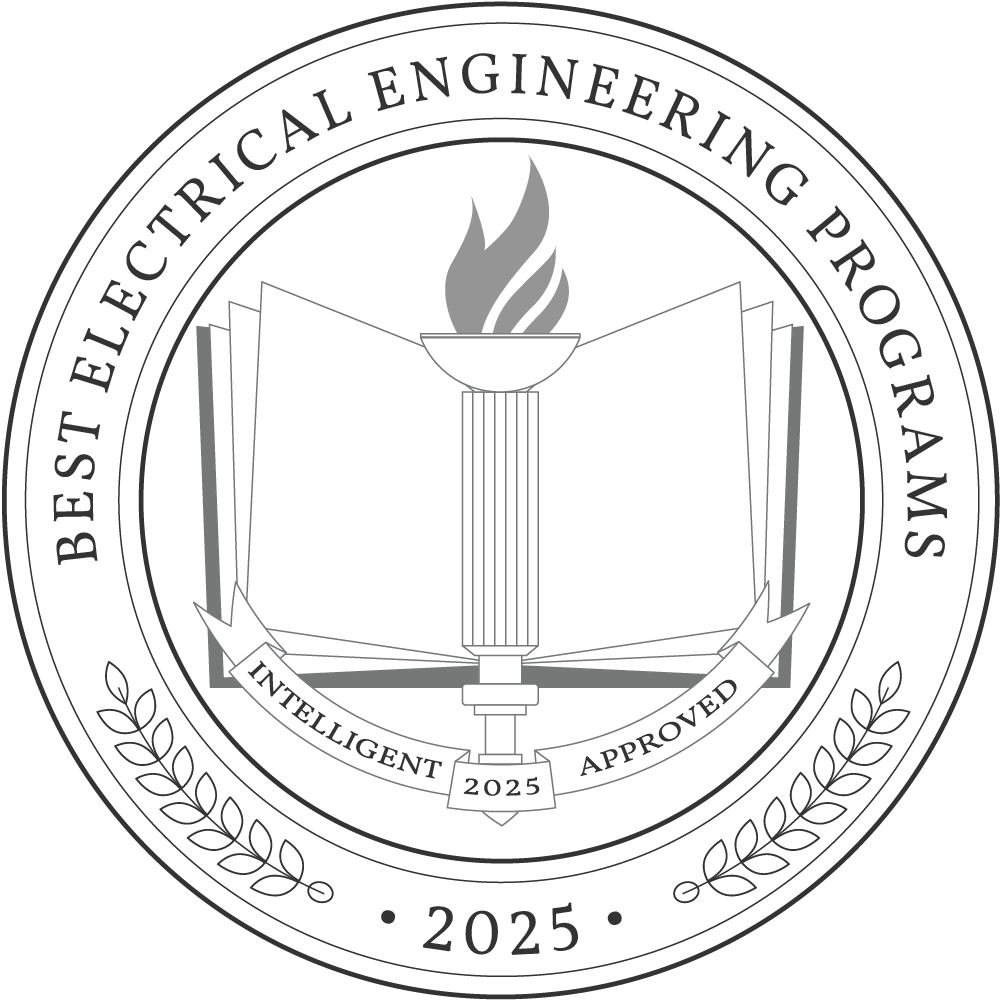Electrical engineers apply a mastery of physics and mathematics to invent, innovate, and improve electrical systems in every modern industry. Along with civil, chemical, mechanical, and industrial engineers, electrical engineers use problem-solving skills honed in engineering courses to innovate in a variety of fields, including robotics, computer science, and mechanics.
In 2023, the average cost of an associate degree in engineering was $3,885, and a bachelor’s degree program cost $17,709. Most electrical engineers also complete a master’s degree, which costs an average of $20,513.
After graduation, electrical engineers earn a median annual wage of $106,950, more than twice the median annual wage for all professions ($48,060). Electrical engineers who design instruments and devices earn a median salary of $125,930, while those who specialize in semiconductor manufacturing earn a median annual wage of $144,960.
Why Trust Us
The Intelligent.com Higher Education Team is dedicated to providing students with independent, equitable school and program rankings and well-researched resources. Our expert-driven articles cover topics related to online colleges and programs, paying for school, and career outlooks. We use data from the U.S. Department of Education’s College Scorecard, the National Center for Education Statistics, and other reputable educational and professional organizations. Our academic advisory team reviews content and verifies accuracy throughout the year for the most current information. Partnerships do not influence rankings or editorial decisions.
- Analyzed over 2,000 national, accredited, and nonprofit colleges and universities
- 800+ rankings pages are reviewed and updated yearly
- Content is informed by reputable sources, surveys, and interviews with academic advisors and other experts
- Over 100 data points are reviewed for accuracy and quality throughout the year, including sources
How we rank schools
Our list features the best Electrical Engineering degree programs at top colleges nationwide. Each school featured is a nonprofit, accredited institution — either public or private — with a high standard of academic quality for post-secondary institutions.
We evaluated each school’s program on tuition costs, admission, retention and graduation rates, faculty, reputation, and the student resources provided for online students. We collected data from trusted sources like the National Center for Education Statistics, individual school and program websites, school admissions counselors, and other data sources. Then, we calculated the Intelligent Score on a scale of 0 to 100 based on the following criterion:
Academic Quality:
- Admission rate versus enrollment rate
- Retention rate of students who return after year one
- Accreditation status (regional and programmatic)
- Nonprofit status, both private and public institutions
Graduation Rate
- Overall graduation rate
- Total number of currently enrolled students, including diversity metrics
- Student-to-faculty ratio
Cost and ROI
- In-state and out-of-state per-credit tuition rates and fees
- Required credits to graduate
- Earning potential after graduation
- Availability of federal student loans, scholarships, and other financial aid options
Student Resources
- Available student services for online-only and hybrid programs
- On-campus amenities like tutoring centers and the number of libraries
Read more about our ranking methodology.
Best 50 Accredited Electrical Engineering Degree Programs
FiltersInstitution Type
Status
- Intelligent Score
- Alphabetically By University Name
- Acceptance Rate
- Enrollment
- In-state Graduate Tuition
- Out-of-state Graduate Tuition
- In-state Undergraduate Tuition
- Out-of-state Undergraduate Tuition

MIT EECS
Intelligent Score: 99.67In-state: $53,450
Out-of-state: $53,450
In-state: $53,450
Out-of-state: $53,450
SAT: 1510-1580
ACT: 34-36
$925
On-Campus
Accreditation Board for Engineering and Technology
124-132

Berkeley Engineering
Intelligent Score: 99.12In-state: $11,442
Out-of-state: $41,196
In-state: $11,442
Out-of-state: $11,442
SAT: 1310-1530
ACT: 30-35
Resident: $550
Non-Resident: $835
On-Campus
Accreditation Board for Engineering and Technology
120

Stanford University
Intelligent Score: 97.92In-state: $55,473
Out-of-state: $55,473
In-state: $54,315
Out-of-state: $54,315
SAT: 1420-1570
ACT: 31-35
$1,028 - $1,714
On-Campus
Accreditation Board for Engineering and Technology
126

Georgia Tech
Intelligent Score: 97.71In-state: $10,258
Out-of-state: $31,370
In-state: $14,064
Out-of-state: $14,064
SAT: 1370-1530
ACT: 31-35
Resident: $508 Non Resident: $1,551
On-Campus
Southern Association of Colleges and Schools Commission on Colleges
127

University of Michigan
Intelligent Score: 97.37In-state: $16,520
Out-of-state: $53,669
In-state: $24,344
Out-of-state: $24,344
SAT: 1340-1520
ACT: 31-34
Resident: $942
Non-Resident: $2,684
On-Campus
Accreditation Board for Engineering and Technology
128

Carnegie Mellon University
Intelligent Score: 96.78In-state: $57,560
Out-of-state: $57,560
In-state: $46,441
Out-of-state: $46,441
SAT: 1460-1560
ACT: 33-35
$898
On-Campus
Accreditation Board for Engineering and Technology
126

California Institute of Technology
Intelligent Score: 96.33In-state: $54,570
Out-of-state: $54,570
In-state: $54,570
Out-of-state: $54,570
SAT: 1530-1580
ACT: 35-36
$2,027
On-Campus
Western Association of Schools and Colleges
120-121

University of Illinois at Urbana - Champaign
Intelligent Score: 95.76In-state: $14,317
Out-of-state: $33,824
In-state: $15,016
Out-of-state: $15,016
SAT: 1200-1460
ACT: 27-33
Resident: $749
Non-Resident: $1,626
On-Campus
Accreditation Board for Engineering and Technology
128

Princeton University
Intelligent Score: 95.49In-state: $48,502
Out-of-state: $48,502
In-state: $53,890
Out-of-state: $53,890
SAT: 1450-1570
ACT: 32-35
$2,080
On-Campus
Accreditation Board for Engineering and Technology
120

Purdue University
Intelligent Score: 95.18In-state: $9,208
Out-of-state: $28,010
In-state: $9,208
Out-of-state: $9,208
SAT: 1170-1420
ACT: 25-33
In-State: $607
Out-of-State: $1,782
On-Campus
Accreditation Board for Engineering and Technology
124

Colorado School of Mines
Intelligent Score: 91.22In-state: $16,650
Out-of-state: $37,350
In-state: $16,650
Out-of-state: $16,650
SAT: 1270-1440
ACT: 28-33
Resident: $729
Non-Resident: $1,386
On-Campus, Online
Higher Learning Commission
128

University of Texas at Austin
Intelligent Score: 90.7In-state: $11,448
Out-of-state: $40,032
In-state: $12,028
Out-of-state: $12,028
SAT: 1210-1470
ACT: 26-33
Resident: $540
Non-Resident: $1,922
On-Campus
Accreditation Board for Engineering and Technology
125

University of California, Los Angeles
Intelligent Score: 90.23In-state: $11,442
Out-of-state: $41,196
In-state: $11,442
Out-of-state: $11,442
SAT: 1310-1530
ACT: 30-35
Resident: $505
Non-Resident: $790
On-Campus
Accreditation Board for Engineering and Technology
121

Cornell Engineering
Intelligent Score: 89.63In-state: $58,586
Out-of-state: $58,586
In-state: $29,500
Out-of-state: $29,500
SAT: 1400-1540
ACT: 32-35
$1,750
On-Campus
Accreditation Board for Engineering and Technology
126

Texas A&M University College of Engineering
Intelligent Score: 89.58In-state: $8,395
Out-of-state: $36,849
In-state: $6,775
Out-of-state: $6,775
SAT: 1160-1380
ACT: 26-32
Resident: $555
Non-Resident: 1,732
On-Campus
Accreditation Board for Engineering and Technology
128

University of Pennsylvania
Intelligent Score: 88.77In-state: $53,166
Out-of-state: $53,166
In-state: $37,678
Out-of-state: $37,678
SAT: 1460-1570
ACT: 33-35
$1,954
On-Campus
Accreditation Board for Engineering and Technology
120

California Polytechnic State University
Intelligent Score: 88.14In-state: $33,522
Out-of-state: $53,706
In-state: $40,608
Out-of-state: $40,608
SAT: 1240-1470
ACT: 22-33
Resident: $196 - $289
Non-Resident: $476 - $569
On-Campus
Accreditation Board for Engineering and Technology
128

University of California San Diego
Intelligent Score: 87.95In-state: $11,442
Out-of-state: $41,196
In-state: $11,442
Out-of-state: $11,442
SAT: 1310-1530
ACT: 30-35
Resident: $391 - $403
Non-Resident: $1,017 - $1,050
On-Campus
Accreditation Board for Engineering and Technology
120
How to Choose an Electrical Engineering Degree Program
Choose your area of study
The area of electrical engineering you study depends on your desired educational focus. General electrical engineering degrees include Associate of Science (AS) in electrical engineering, Bachelor of Science (BS) in electrical engineering, and Master of Science (MS) in electrical engineering.
Students seeking a more specialized degree with more engineering core classes may choose a Bachelor of Engineering (BEng) with a focus in electrical engineering or a Master of Engineering (MEng) with a focus in electrical engineering.
Many electrical engineering programs cross over into computer science coursework. If you’re interested in this specialty, choose a bachelor’s or master’s degree in electrical engineering and computer science. You can also enroll in a combined bachelor’s and master’s in electrical engineering program, which allows you to finish two degrees in an accelerated amount of time.
Research schools and programs
Ensure that your chosen school and program are accredited by institutional and programmatic agencies, such as the Higher Learning Commission (HLC) and the Accreditation Board for Engineering and Technology (ABET). These agencies confirm that your school meets academic standards and the electrical engineering program properly prepares students for careers in the electrical engineering field.
Once you’ve selected an accredited school and program, take a campus tour with your needs in mind. Determine whether you can secure undergraduate or graduate housing, and meet with professors from the school of engineering to determine whether the program is the right fit for you.
Prepare for tests and applications
To qualify for an associate or bachelor’s degree in electrical engineering, you’ll likely need high math scores on the SAT or ACT. Some graduate-level electrical engineering programs require applicants to take the Graduate Record Examination (GRE), while others consider it optional.
Other application materials needed by electrical engineering programs include:
- A letter of intent or a personal statement
- Letters of recommendation
- A sealed transcript showing that you’ve earned the minimum GPA required
- A demonstration of your physics and mathematics skills and experience, including prerequisite courses, a thesis project from a previous degree program, or high math and science scores on entrance exams
Select your program
The best electrical engineering program for you depends on your career goals and desired coursework path. Choose a program offered in a college of electrical engineering for specialized electrical engineering courses. If you’re integrating your study in electrical engineering with computer science, find a program in a college of electrical and computer engineering. Talk to alums from the programs on your list, and ask questions about coursework and postgraduate careers or trajectories for furthering your education.
Determine how you’ll pay for your degree
Submit the Free Application for Federal Student Aid (FAFSA) to determine how much financial aid you can obtain. After you’ve applied that number to your education budget, factor in costs like tuition, room and board, materials, and transportation. Contact your school’s financial aid office to learn about additional financial aid opportunities, particularly grants or scholarships for engineers.
What Can You Expect From an Electrical Engineering Degree Program?
Electrical engineering programs focus on the physics of electricity to prepare graduates for work in that field. Undergraduate students take a combination of math, science, and engineering courses before branching into more specialized topics. Most coursework includes labs, individual and group projects and a capstone. Graduates can become licensed professional engineers after they take the Fundamentals of Engineering Exam, also known as the FE exam.
Potential courses you’ll take in an electrical engineering degree program
- Electromagnetics. Students review and deepen their understanding of electromagnetics, including electrostatics, magnetostatics, one-dimensional resonators, and the one-dimensional wave equation.
- Physics for Engineers. This physics course covers the fundamentals of physics, calculus, and vectors. It connects statistical physics and mechanics with advanced mathematical models.
- Electrical Circuits. This course on electrical circuits is a hands-on and theoretical class that encourages students to apply their understanding of direct current circuit analysis to real-life situations and lab projects.
- Robotics Programming. Students integrate their knowledge of electrical engineering with computer science concepts as they design, create, and program robotic units.
Electrical Engineering Degree Frequently Asked Questions
How do I apply to an electrical engineering degree program?
The school’s admissions website is the first place to look for application requirements for an electrical engineering degree program. Typically, the program will have its own application page, which includes deadlines and admissions prerequisites. You’ll also find potential course descriptions and application packet contents, which may include transcripts, admission tests, and a minimum GPA.
Contact your school’s admissions office or a program representative if you have additional questions about applying to an electrical engineering program, including early admissions possibilities.
How much does an electrical engineering degree cost?
In 2023, the average annual cost of an associate in electrical engineering was $3,885. For a bachelor’s degree in electrical engineering, students pay an average of $17,709 — $30,884 when you include the cost of room and board. A master’s in electrical engineering averaged $20,513 per year.
How long does it take to earn an electrical engineering degree?
A two-year associate degree in electrical engineering requires around 60 credit hours, with each school year’s schedule containing about 30 units. A bachelor’s program in electrical engineering requires 120 credit hours, which takes students four years to complete. Graduate degrees require an additional 30 to 60 credits after completing a bachelor’s degree and take one to two years.
You’ll find additional timelines available in many electrical engineering programs. Combined bachelor’s and master’s in electrical engineering programs allow students to earn their undergraduate and graduate degrees simultaneously, and accelerated engineering programs let them take more credit hours per semester or quarter. If you need a more flexible academic schedule, find a part-time program that takes a few more years to complete with fewer courses each grading period.

